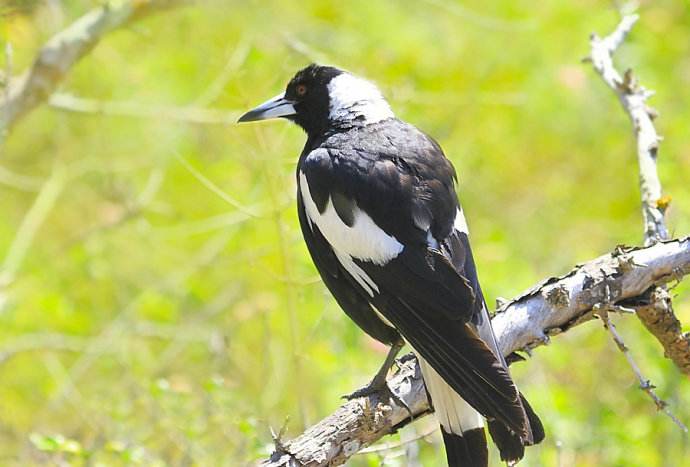This is Scientific American — 60-Second Science. I'm Jason G. Goldman.
Got a minute?
Of the many thousands of species of birds on Earth, only about 25 are known to do something special with their food—they dunk it in water before eating.
Nobody knows for sure why the birds do it. It might moisten foods for easier eating. Or it might wash away nasty-tasting chemicals. The behavior is seen most often in super smart species, like crows. And now it's been observed for the first time in a bird called the Australian magpie.
"We were very, very lucky to see it. It was entirely by chance." University of Cambridge zoologist Eleanor Drinkwater.
"And so, on a day to day basis, we'd get up and we would essentially spend hours and hours following these different families of magpies around the place, and tempt them towards us and then see how they reacted when we presented them with different foods."
The researchers offered an adult male magpie a mountain katydid, an insect that's presumed to be distasteful. It's thought that the insect defends itself against being gobbled up by secreting a bitter substance from underneath its wings as well as by vomiting a bitter-tasting cocktail.
"This one individual comes up and takes the katydid that we presented and kind of waddles off, and then goes and kind of plops it in a little stream that was behind us. We were kind of watching this together and looking at each other, like, this is a bit interesting. Haven't seen this before."

But then something even more surprising happened. The magpie dropped the wet katydid on the ground and hopped away. A few minutes later, a juvenile magpie approached, dunked the katydid once again in the puddle, and then gobbled it up. The observations were described in the journal Australian Field Ornithology.
Drinkwater thinks what they saw might be an example of social learning in this species.
"To us, it kind of appeared to be the case that it could be food washing. That would make sense within the context of this particular insect."
While the behaviors are hard to interpret, she says that she and her team reported these observations in hopes that other researchers might investigate the behavior further.
"We were just very, very fortunate to be in the right place at the right time to see this interesting behavior. And in the current day and age, there are loads of people with iPhones and cameras who I'm sure have also captured all sorts of weird and wonderful animal behavior, which might not be common knowledge to the scientific community."
And unless those folks think to share their photos and videos with experts, who knows what discoveries are out there remaining to be made.
Thanks for the minute for Scientific American — 60-Second Science Science. I'm Jason G. Goldman.













